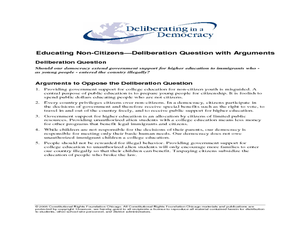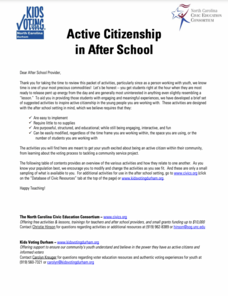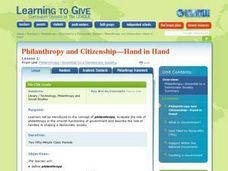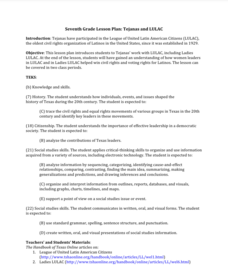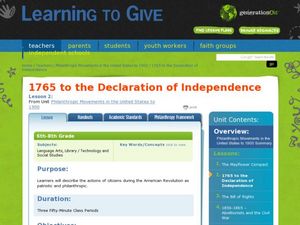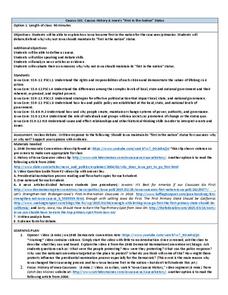Deliberating in a Democracy
Educating Non-Citizens
Students distinguish between the privileges of being a U.S. Citizen and privileges that are forfeited if not a U.S. Citizen. For this history lesson, students analyze the rights of people in a democratic society through research,...
Museum of Tolerance
Citizenship Then and Now: Comparing Ancient Rome and Contemporary American Society
Class members research citizenship in Ancient Rome and in the United States and use the provided graphic organizers to compare the rights and responsibilities of citizens in these two democracies.
Carolina K-12
Active Citizenship in After School
Active citizenship is the bedrock of any great democracy. Continue the trend by teaching the next generation about voting rights and the functions of elections in society. The variety of activities in the resource includes a human...
Museum of Tolerance
The Role of Citizens in a Participatory Democracy
Groups research participatory democracies and compare the role and rights of citizens in ancient history with those in recent U.S. history. Guided by a series of questions, individuals compose a persuasive essay in which they discuss the...
Curated OER
A River Ran Wild: An Environmental History
The Nashua River serves as the focal point of an investigation of the treatment of and care for natural resources. A reading of A River Rand Wild: An Environmental History by Lynne Cherry, launches the study and class members consider...
National Endowment for the Humanities
Revolution '67, Lesson 1: Protest: Why and How
To some people, protesting is as American as apple pie, but the factors that lead to protests can be as confusing to veteran activists as to today's youth. Revolution '67 explores the riots in Newark, New Jersey as a case study. ...
Judicial Learning Center
Law and the Rule of Law
We hear a lot about the importance of the rule of law, but most people do not really know what those words mean. The lesson is a webpage that defines the rule of law, explains why it is important in a democratic society and provides...
Curated OER
Philanthropy and Citizenship-Hand in Hand
Young scholars define philanthropy and evaluate how the government would functin without the help of volunteers. They write song lyrics, participate in a class discussion, and complete a Venn diagram.
Curated OER
Community Treasures (Rivers and Trees): An Integrated Curriculum Unit
Third graders demonstrate an understanding of geography and its effects on lifestyles and culture. Then they apply basic economic terms and principles
and identify the United States government and history. Students also identify and...
Texas State Historical Association
Tejanas and LULAC
Seventh graders explore the Latino Civil Rights Movement. In this civil rights lesson plan, 7th graders discover the role of the League of United Latin Citizens (LULAC) as well as the women's arm of the organization and write essays that...
Curated OER
Children's Rights
Students research studenT rights in democratic and non-democratic societies. They create group projects such as advertisements and posters, which demonstrate their awareness of civic involvement.
Curated OER
The Void Filled by Nonprofits
Students examine the significance of nonprofit organizations in a democratic society. They conduct research on a selected nonprofit organization, complete a questionnaire, and present their findings to the class.
Curated OER
Strengthening Democracy in Africa
Middle schoolers analyze democratic advances in Africa. In this global issues lesson, students research Internet, video, and print sources regarding current political developments in Africa. Middle schoolers create e-collages or digital...
Curated OER
Participatory Citizenship
Students explore U.S. politics by completing a class project. In this National policy activity, students review and compare the National Service Act of 1990 and the Kennedy Service Act and the importance of service in the U.S.A. Students...
Curated OER
Active Citizenship through the Spectacles of Benjamin Franklin
Students research and identify ways that Benjamin Franklin contributed to society. They identify the core democratic values and how he achieved them. They research organizations in their area that give back to the community.
Curated OER
Learning from the Past: A New Approach
Young scholars research nonprofit organizations. As they research, they learn how those living in the colonial period formed community organizations to provide for the common good of their society. Each pupil chooses one organization to...
Curated OER
1765 to the Declaration of Independence
Students research philanthropists of the American Revolution. In this philanthropy lesson, students watch the video Johnny Tremain and analyze the characters and determine their motives. Students read the Declaration of Independence...
Caucus 101
Caucus History and Iowa’s “First in the Nation” Status
What is a caucus? Why is Iowa's first? Why did Iowa shift to the caucus format? After researching these basic questions, class members debate the question of whether or not Iowa should maintain its "first in the nation" status for caucuses.
Curated OER
What is Democracy?
Students explore the facets of democracy. In this civic responsibility instructional activity, students create a definition of democracy and discuss the difference between a spectator and a participatory citizen. Students discuss whose...
Curated OER
Are There Any Heroes Out There?
Students explore political candidates' viewpoints on issues that contribute to the "common good." In this political candidates lesson plan, students read and view mixed media to identify political issues that contribute to a civil...
Curated OER
Power of the People
Pupils determine the meaning of democracy and investigate accomplishments of a number of United States presidents. They look at images of the presidential one dollar coins before they determine how the job of the president differs from...
Curated OER
Civil Liberties and National Security
High schoolers identify the civil liberties outlined in the U.S. Bill of Rights and discuss the importance of these liberties in today's society. They research examples of when Congress has taken legislative action to protect national...
Curated OER
Helping Ourselves: Why Philanthropy Works
Young scholars discover the concept of philanthropy. In this civics activity, students investigate the role of philanthropy in our society, and how it makes life better for all.
Curated OER
Canada Belongs to Us All
Tenth graders have the opportunity to meet with people in their own school who have not lived in Canada their entire lives. They describe fundamental beliefs and values associated with democratic citizenship.
